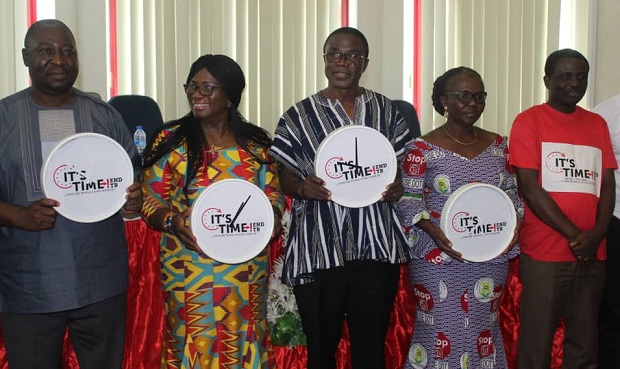Dignitaries at the event with cloak to symbolize it’s time… find the missing people with TB
The National Tuberculosis (TB) Programme has announced the adoption of a TB intervention plan aimed at specifically halting new TB infections and reversing the burden of the disease in the country.
The pilot implementation of the plan, ‘TB Prevention Therapy (TPT), which entails a three-month course of drugs to prevent tuberculosis, has already began with the full roll-out expected soon.
This was disclosed at the launch of the 2019 World TB Day in Accra, themed, “It’s Time.”
Dr. Frank Bonsu, National TB Programme Manager, said TB treatment outcomes for patients in Ghana continue to be one of the best with a treatment success rate of 86% and only 4% lost to follow up patients.
He however noted that the proportion of dying patients- 7%- is unacceptable.
This he noted was as a result of late reporting of patients to health facilities.
“One important missing ingredient is our inability to continue to create the demand for TB services and public education,” he said.
Dr. Bonsu indicated that in 2018, only 32 more TB cases were reported over the previous year’s total case notification.
“The country recorded 14,582 people with TB disease. 732 of these cases were children representing 5.2% of total case notification. Greater Accra and Ashanti Regions persistently report the highest number of TB cases 2,619, 2,470 respectively,” he explained.
Ghana is estimated to be detecting about 44,000 TB cases but only about 15,000 are done annually with about 29,000 TB cases going undiagnosed each year.
Minister of Health, Kwaku Agyeman-Manu thus noted that government in response, has procured laboratory equipment that includes 48 digital X-Ray machines, 128 Genexpert machines, in the bid to detect early and treat missed TB cases.
“It is imperative for us all to find, treat and cure all these missed TB cases to reach our final goal of ending TB,” he said.
Dr. Own Kaluwa, World Health Organization (WHO) Country Representative, said the 2018 WHO Global report showed a decline in TB burden globally with the African Region being no exception.
He however called for efforts to be made to identify and remove the challenges that are slowing down progress as well as adopt and roll out the most cost effective policy options and interventions.
“Core TB control services should be funded from domestic resources and in line with universal health coverage, we must ensure that quality assured preventive, diagnostic, treatment and care services are available for all,” he stated.
By Jamila Akweley Okertchiri


